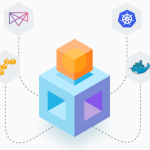AI research impacts significantly on compute and storage power nowadays. With the proliferation of Artificial Intelligence (AI) and Machine Learning (ML) workloads in many industries and organisations, ML models have become more complex. Therefore, there is a need to build compute environments for AI that have immense level of scalability as per demand. An integration of GPU systems, software, and management tools to better control mission-critical workloads, hence there is a need for systems to automate these deployments.
Hyperconverged Infrastructure supports AI and ML workloads by providing hardware and software components that can scale on demand for processing huge data in real-time. Education, Retail, IT and ITES, Healthcare and Manufacturing industries require more and more compute and storage power as they are shifting to digital transformation and AI to increase the business data.
Disadvantages of AI on Cloud
Cloud is considered the least expensive platform to run AI/ML workloads as they have a reservoir of development tools and other resources such as pre-trained deep neural networks for voice, text, image, and translation processing. Those applications may not be able to run on the cloud platform on which they were developed. Now platform stickiness, in case of CSP is not a bad thing as GPUs and FPGAs accelerate training process and you don’t have to deal with complex hardware configurations. But the requirement of massive computation will eventually persist as you will not stop training your neural networks. This level of computing on the cloud can be expensive than building a private cloud to train and run neural networks. Reserving GPUs for longer time in public cloud can be easier but building your private cloud will remain a better option.
How HCI can support AI workloads?
AI helps HCI platforms manage systems and workloads as well as automating everyday tasks. Machine learning and automation enhance productivity for organisations that use them to increase application performance and manage large volumes of data. AI optimises HCI storage, manages workload demands and optimise application workloads. HCI automation optimises storage for peak performance and allocates processing workloads to level out demands and maintain peak performance with minimum system lags and crashes.
How do containers help AI workloads?
Kubernetes and Docker bring unified architecture for AI applications. Many Enterprise platforms are built using containerisation for collecting, organising, and processing data for analytics, machine learning and deep learning models.
AI/ML applications that require access to data can ensure these containerised apps access the uniform view of the data regardless of where they are deployed whether it on-premises or the cloud. AI apps that run on cloud platforms need Kubernetes to scale the apps and leveraging the data capacity to machine learning models via containerised clusters which may not be possible with other on-prem systems. The built-in tools of containers for external and distributed data access can be used for common data-oriented interfaces to maintain many data models.
Another secret of AI on Kubernetes is it provides tailored infrastructure. You can choose bare metal for mathematically intensive workloads such as HPC, ML, 3D applications and significant storage needs. The portability of these tailored infrastructures is the uniqueness of containerising workloads. You can pick what infrastructure you need now and add on more later.
Skylus
The Tyrone Skylus AI approach combines the proven hyper-converged infrastructure technology with private cloud using GPUs and FPGAs for computing and low latency 10G or 25G ethernet switch. This architecture is customised as per user need and delivers data efficiently to GPUs and scales on-demand.
For deep learning models, IT teams require parallel processing capabilities of multiple GPUs while training inferences. With the large influx of data for initial training of a model, for periodic model re-training to refine it. This training process is iterative, and the total workload grows over time.
Skylus provides:
-> Easy deployment and management with comprehensive tools for patching, software upgrades and easy to manage data protection
-> Easy scalability as AI deployments can grow rapidly as you move into production. With the growth in datasets, new data sources are added, and algorithms increase in complexity. Skylus gives scale-out support as needs grow without any bottlenecks or re-architecting hassles.
-> Provides built-in security for sensitive data. The need to deploy dedicated architecture for AI can be reduced as Skylus gives two-factor authentication and data-at-rest encryption with a hardened security framework that ensures compliance with strictest standards.
A cleansing hot shower or bath
Lorem ipsum dolor sit amet, consectetur adipisicing elit, sed do eiusmod tempor incididunt ut labore et dolore magnaaliqua. Ut enim ad minim veniam, quis nostrud exercitation ullamco laboris nisi ut aliquip ex ea commodo consequat.Duis aute irure dolor in reprehenderit in voluptate velit esse cillum dolore eu fugiat nulla pariatur. Excepte ursintoccaecat cupidatat non proident, sunt in culpa qui officia.
Setting the mood with incense
Lorem ipsum dolor sit amet, consectetur adipisicing elit, sed do eiusmod tempor incididunt ut labore et dolore magnaaliqua. Ut enim ad minim veniam, quis nostrud exercitation ullamco laboris nisi ut aliquip ex ea commodo consequat. Duis aute irure dolor in reprehenderit in voluptate velit esse cillum dolore eu fugiat nulla pariatur. Excepteursint occaecat cupidatat non proident, sunt in culpa qui officia.


